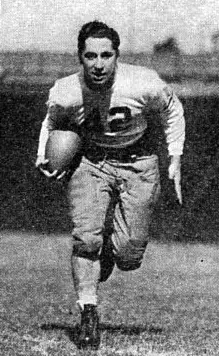Marshall Goldberg
(1917 - 2006)

Marshall Goldberg was born on October 24, 1917, in Elkins, West Virginia, to a Jewish family. Goldberg attended Elkins High School, where he was captain of the basketball, football, and track teams. He was named All-State in all three sports.
At the University of Pittsburgh, he led the Pitt Panthers to back-to-back national championships in 1936 and 1937. Goldberg’s 1936 team won the 1937 Rose Bowl. He finished third in the Heisman Trophy voting in 1937 and was runner-up for the Heisman in 1938. He was also an All-American in both 1937 and 1938, first as a halfback and then as a fullback. During his Pitt career he amassed 1,957 rushing yards, a school record that stood until 1974 when Tony Dorsett surpassed it. Goldberg was part of Pitt’s legendary Dream Backfield along with Dick Cassiano, John ‘Chick’ Chickerneo, and Curly Stebbins. Some experts consider Pitt’s Dream Backfield superior to the more famous Four Horsemen of Notre Dame.
After college Goldberg played in the National Football League for the Chicago Cardinals from 1939 to 1943, interrupted by his service during World War II in the United States Navy, then again from 1946 to 1948. The team won the NFL Championship in 1947 and won their division the next year. Goldberg was a four-time NFL All-Pro.
Goldberg joined the Navy in 1943 and spent two years in the South Pacific rising to the rank of lieutenant. He worked in the insurance industry after his football career ended. In 1965, he took over a machine parts company, Marshall Goldberg Machine Tools Ltd., of Rosemont, Illinois.
Goldberg was elected by Sports Illustrated to the 1930s College Football Team of the Decade. In 1958, he was enshrined in the College Football Hall of Fame and several other halls of fame, including that of the City of Pittsburgh, the West Virginia Sports Writers Hall of Fame, and the National Jewish Sports Hall of Fame.
His jersey number is retired by the Arizona Cardinals and he is in the Arizona Cardinals Ring of Honor.
Goldberg died in 2006 at age 88 at a nursing home in Chicago. Following his death, his daughter, Ellen Tullos, and his widow, Rita Goldberg, helped to set up The Marshall Goldberg Traumatic Brain Injury Fund at The University of Illinois at Chicago. Goldberg had sustained several concussions during his career, which the family felt contributed to difficulties later in his life. This fund has been instrumental in bringing attention to the problem of head injury in athletes.
Source: “Marshall Goldberg,” Wikipedia.


